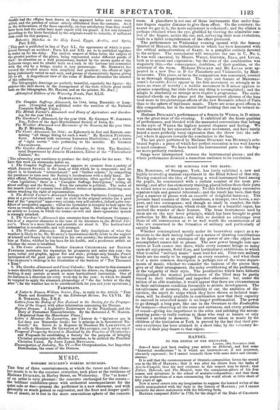MUSIC.
MADAME DULCKEN'S sondes MUSICALES.
Tax first of three entertainments, at which the rarest and best cham- ber-music is to be the constant attraction, took place at the residence of Madame DULCKEN, in Harley Street, on Wednesday. The "at home" Of an artist is very pleasant: the concerto exchanged for the sonata— the. brilliant exhibition-piece with orchestral accompaniment for the quiet solo or duo—present the performer in a new character, and with generally as much gained to expression, and the finer and deeper quali- ties of music, as is lost in the more ostentatious sphere of the concert- room. A pianoforte is not one of those instruments that under first- rate fingers require distance to give them effect. On the contrary, the nearer we get to it, the more enjoyment is enhanced ; and the climax is perhaps obtained when the eye, gratified by viewing the admirable con- trol of the fingers, assists the ear, and, surveying their neat evolutions, leads to a fuller comprehension of the effect produced. The performance on Wednesday evening opened with the famous Quartet of MOZART, the introduction to which has been honoured with the critical animadversions of SA.RTI, in a pamphlet entirely devoted to the subject. The connoisseur will recognize the one in C, No. 6. It was well executed, by Messrs. WHAT, GOFFRIE, ELLA, and Lucas, both as to accent and expression ; but the tone of the combination was singularly thin,—the consequence, doubtless, of their position, or the structure of the room. Madame DULCKEN and Mr. Lucss next ap- peared in a new Duo in D for Pianoforte and Violoncello, by MEN- DELSSOHN. This piece, as far as the composition was concerned, created in us thorough disappointment. The style and feature of MENDEL:3- sonies favourite Lieder appear in the first movement so strongly as to leave no trace of novelty ; a middle movement in B minor appears to promise something, but ends before any thing is accomplished ; and the adagio is absolutely so strange as to require a programme. The eccle- siastical chords on the piano and the impassioned phrases of the bass tend more to the picturesque effects of the new Romantic school of Paris than to the sphere of legitimate music. There are some good effects in this composition, but in the matter itself nothing that can be termed in- spiration.
Madame DULCKEN'S performance of a Sonata by WEBER, in D minor, was the great treat of the evening. It exhibited all the finest qualities of performance, and blended with the mannered conventions that belong to the style of WEBER the highest natural elegance and feeling. We were charmed by her execution of the slow movement, and have rarely heard a more perfectly vocal expression than she threw into the sub- ject where it appears towards the conclusion in the bass.• The last piece performed by Madame DULCKEN was HUMMEL'S cele- brated Septet ; a piece of which her perfect execution is too well known to need comment. We have heard the instrumental parts to this Sep- tet more perfectly rendered.
Songs were interspersed between the instrumental pieces ; and the whole performance detained a numerous audience to its conclusion.


























 Previous page
Previous page